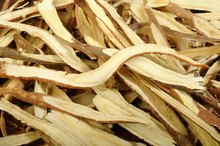Side Effects of Goji Berries
Known for centuries as an herbal supplement with many health benefits, goji berry has been prescribed by alternative medicine medical professionals for the treatment of disorders ranging from high blood pressure to gastrointestinal problems, according to Dr. Timothy Moynihan of the Mayo Clinic. However, patients interested in taking the herb must also be aware of the possible side effects associated with goji berry consumption.
Drug Interactions
As with any new medication or herbal supplement, patients interested in adding goji to their diet should be aware that possible drug interactions may occur if these patients are already currently taking additional medication. According to Moynihan, the most adverse drug interactions noticed in patients are those individuals who begin treatment with goji berry who already take prescription medication for the treatment of diabetes. This is primarily due to the herb’s natural qualities that can affect insulin and pancreas function (two main factors that are affected by diabetes). As a result, Moynihan recommends seeking the advice of a medical professional before starting goji berry consumption or supplement use.
- As with any new medication or herbal supplement, patients interested in adding goji to their diet should be aware that possible drug interactions may occur if these patients are already currently taking additional medication.
- According to Moynihan, the most adverse drug interactions noticed in patients are those individuals who begin treatment with goji berry who already take prescription medication for the treatment of diabetes.
Digestive System
Banaba Leaf Extract Side Effects
Learn More
A common side effect seen in most medications or supplements newly introduced to the body is irritation of the digestive system. According to TheHealthCareCenter.org, goji berry users have reported minor digestive problems that resulted from beginning treatment associated with goji berry supplements. These minor disorders include diarrhea, indigestion, nausea, and vomiting (in extreme cases). Allergic reactions to the herb may also cause digestive system distress, especially after prolonged use of the supplement. As a result, goji berry as a supplement is best taken with food or on a full stomach to limit the probability of stomach upset.
- A common side effect seen in most medications or supplements newly introduced to the body is irritation of the digestive system.
- According to TheHealthCareCenter.org, goji berry users have reported minor digestive problems that resulted from beginning treatment associated with goji berry supplements.
Increased Bleeding
Although it is rare, another side effect that supplement users should be aware of before consuming goji is the herb’s natural qualities that may affect blood clotting. According to PeaceHealth.org, a case study described on the website documents at least one case where a woman presented with increased bleeding during menstruation after beginning a goji-based supplement program that included the consumption of three to four glasses of goji berry juice a day. While no additional adverse effects related to increased bleeding have been officially published, users should still check with their doctor if they have a history of blood clot-related disorders.
Related Articles
References
- [Historical Record] Goji berries. FoodData Central. U.S. Department of Agriculture. Published April 1, 2019.
- Goji berries, dried. FoodData Central. U.S. Department of Agriculture. Published April 1, 2019.
- Vitamin C: Fact Sheets for Health Professionals. National Institutes of Health, Office of Dietary Supplements. Updated February 27, 2020.
- Ma ZF, Zhang H, Teh SS, et al. Goji berries as a potential natural antioxidant medicine: An insight into their molecular mechanisms of action. Oxid Med Cell Longev. 2019;2019:2437397. doi:10.1155/2019/2437397
- Li S, Liu N, Lin L, et al. Macular pigment and serum zeaxanthin levels with Goji berry supplement in early age-related macular degeneration.International Journal of Ophthalmology. 2018;11(6):970-975. doi:10.18240/ijo.2018.06.12
- Cai H, Liu F, Zuo P, et al. Practical application of antidiabetic efficacy of Lycium barbarum polysaccharide in patients with type 2 diabetes. Med Chem. 2015;11(4):383-90. doi:10.2174/1573406410666141110153858
- Heart Healthy Eating to Help Lower Cholesterol Levels. Cleveland Clinic. Updated 2018.
- Larramendi CH, García-abujeta JL, Vicario S, et al. Goji berries (Lycium barbarum): risk of allergic reactions in individuals with food allergy. J Investig Allergol Clin Immunol. 2012;22(5):345-50.
- Ma ZF, Zhang H, Teh SS, et al. Goji berries as a potential natural antioxidant medicine: An insight into their molecular mechanisms of action. Oxid Med Cell Longev. 2019;2019:2437397. doi:10.1155/2019/2437397
- Goji Berry Culture. PennState Extension. Updated 2016.
- Albertson A L. Goji berries and pomegranates at extension plant sale. NC Cooperative Extension. Updated 2019.
Writer Bio
Adam Fonseca has been a writer and blogger since 2005. He maintains a number of different blogs on a variety of subjects ranging from health care to golf. Fonseca has a Master of Health Administration degree from the University of Phoenix and degrees in health science and psychology from Bradley University.









